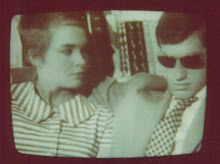Local playwright Kathleen Betsko Yale (http://www.filmreference.com/film/99/Kathleen-Betsko-Yale.html) presented a screening of the film version of her play at The CG Jung Center in Buffalo. It was directed by Claudia Weill, who made my favorite late-1970s movie, Girlfriends.
Johnny Bull is based on the writer's experience as a young woman immigrating to America in 1959 to join her American husband who she had met in Great Britain while he served the military during the Suez Crisis.
The story opens as fresh-faced eighteen-year-old Iris (Susanne Hamilton) arrives all dressed up to meet good-looking Joe (Peter MacNicol), hopeful to find the America of Elvis Presley and Doris Day movies. Fans of a twenty-first television show might refer to this era as the Madmen years. Civil rights and women's rights are heating up in urban areas across the nation, but smalltown America is still a place of sexism and racism. This is where Iris lands to live at Joe's family home in coal mining country of western Pennsylvania.
They reside with Stephen Kovacs (Jason Robards) and his wife Marie (Colleen Dewhurst), a weathered pair of hard-working proud hungarian immigrants. Younger sister, Kathy (Kathy Bates), is a simple-minded young woman who unhappily gives up her bedroom to the young couple. Stephen does not hide his disdain for the "Johnny Bull" (British) dressed in Doris Day clothing. He has just lost his mining job and the burden of more mouths to feed is disheartening.
Iris faces a rude awakening when the America of her fantasies is nowhere near the dismal place she has landed. Carefree and artistic, she obsessively draws shoe designs after a stint working at a shoe factory back home sparked a new ambition. Her aspirations to greet modern life have her dreaming of California, but her new home is a place where the women spend their days baking bread and washing away coal soot. The newlywed romance turns to simple dependence on a husband who does not share her dreams. He becomes more and more like his angry abusive father as her pregnancy grows and daily pressures mount.
Marie has no time for disappointment or whimsey, but we see her softening up around Iris's cheery ways. "You bring the juice back into life" she exclaims. We glimpse a hidden corner of Marie when she tells about a touch of excitement she found briefly during a coal mine strike that sent her to New York City for a housekeeper job where her employee rewarded her with lovely dresses and cash that she hoarded away for the future. The story is laced with enough humor and lightness to balance the intensity of this family struggle through a rough existence and a dark family secret.
Iris toughens under Marie's guidance. She gives birth to her baby and begins to take charge of her own life. This is a beautiful story of two women doing the best they can with difficult circumstances. The film was made for television broadcast, but the viewing experience is like seeing a play unfold. I enjoyed getting to know these characters and the themes remain relevant today.
9/22/10
Subscribe to:
Post Comments (Atom)





No comments:
Post a Comment